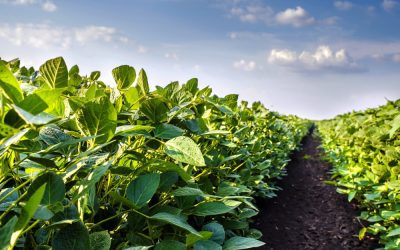Plastic-free, soy-based baby wipes win 2024 Student Soybean Innovation Competition
WEST LAFAYETTE, Ind. (March 27, 2024) — A skin-sensitive baby wipe with only one non-soybean ingredient besides water earned the $20,000 grand prize in the 30th annual Student Soybean Innovation Competition, announced during an awards ceremony on Wednesday evening at the Purdue Memorial Union in West Lafayette, Ind.

Gentle on the skin like silk, SoySilk uses soybean ingredients in every step of the baby wipe production, including the base sheet and the formulation. SoySilk is a plastic-free, vegan, non-toxic, environmentally friendly, biodegradable and compostable alternative to all other baby wipes used in the United States, while still giving customers a quality product.
SoySilk was created by the duo of Purdue University junior Kyle Han from Taipei, Taiwan, and Purdue freshman Ben Gottlieb from Chappaqua, New York. Han is pursuing a bachelor’s degree in biological engineering with a concentration in cellular and biomolecular engineering in the Department of Agricultural and Biological Engineering. Gottlieb is studying finance at Purdue’s Mitchell E. Daniels, Jr. School of Business.
The Student Soybean Innovation Competition is sponsored by the Indiana Soybean Alliance (ISA) and Purdue University. To win this competition, Purdue University students must develop novel applications for soybeans that satisfy a market need.
“ISA looks forward to working with Purdue students each year and seeing what unique products they create,” said ISA Board Chair Kevin Cox, a farmer from Brazil, Ind. “The goal of this competition is to showcase the versatility of soybeans while addressing a need in agriculture or the general public. The results often expand opportunities and markets for all Indiana soybean growers. We are excited about SoySilk. This appears to be a safe and necessary product that we think will be attractive to many people.”
Baby wipes on the market today are made of pulp, plastic and chemicals such as cleaning or disinfecting agents. SoySilk uses soy fiber as the base sheet, soy protein crosslink to increase breaking tenacity, and soy glycerin and soy lecithin as emollients for the skin. No trees are cut down, and no plastic polymers are used, yet it offers the best cleaning effect to consumers. With a soy fiber base sheet, SoySilk created a baby wipe that is 143 percent thicker than the average baby wipes on the market.
“Our product’s mission is to provide a top-tier customer experience in baby wipes while creating positive environmental effects,” Gottlieb said. “Most importantly, SoySilk will pave a new path for wet wipe materials as countries pass new regulations to prohibit the plastic polymers contained in current baby wipes.”

According to Persistence Market Research, the global baby wipes market will reach $9.9 billion by 2032. SoySilk contains 92 percent soy content on a dry weight, which can utilize $313 million worth of soy protein through U.S. sales alone. Gottlieb added, “Our product introduces an innovative business opportunity in a high-value market with an enormous volume of soy for our high-quality Indiana soybean industry to profit and create a positive impact on our planet.”
The United Kingdom’s Department for Environment, Food & Rural Affairs (DEFRA) published a report on April 4, 2023 calling for a ban on baby wipes – or wet wipes – containing plastic. A similar report listed wet wipes as a commonly littered, single-use plastic items in England. A U.K. survey showed 96 percent of respondents supported a ban on wet wipes containing plastic.
“Global consumer-goods manufacturing companies like Proctor & Gamble and Kimberly-Clark have been trying to develop a new material for their Pampers and Huggies baby wipes pipeline without plastic polymers but still strong,” Han explained. “Many companies believe that with the sustainability trend, the European Union and the United States will soon catch up on banning wet wipes that contain plastic. Our team is providing a new alternative with SoySilk baby wipes to tackle the ban and influence the business for the U.S. market.”
This year, 15 teams composed of 48 Purdue University students and 19 faculty advisors, finished the competition. These students represent a variety of majors including agronomy, biological engineering, animal science, pharmacy and environmental and natural resource engineering. Each team works with two faculty advisors who provide technical and market research support.

This year’s judges included four ISA board members: Roger Bommer of Brookville, Ind.; Jason Misiniec of Bicknell, Ind.; Brian Warpup of Warren, Ind.; and Allen Buchanan of Fowler, Ind. Also three industry experts served as judges including Tom Kilcoyne with Next Consulting, Brit Walker with ADM and Lisa Zentner of Crafco.
The contest introduces Purdue students to the multi-faceted uses and vast potential of soybeans while drawing on students’ creativity to develop products that utilize soy. Following the contest, ISA works to develop the products, evaluate their long-term feasibility and commercial viability.
“The Student Soybean Innovation Competition allows ISA to create relationships with bright and creative students and their advisors at Purdue,” said ISA board member Jenna Scott, a farmer from Muncie, Ind., and chair of the ISA Sustainability and Value Creation Committee. “Some of the products from this contest will help us move more soybeans into the market. Indiana soybean checkoff funds are used to find new uses and new markets for our soybeans, which creates more demand and helps our farms to be more profitable and sustainable.”
Previous contest winners include last year’s StyroSoy, which is an environmentally friendly, plastic-free alternative to polystyrene, commonly known as Styrofoam. In 2022, a soybean-based mulch and playground surface called Smulch was the winner. Biostimulant, a liquid biostimulant designed to promote growth in crops grown in vertical farms, won in 2021. The ever-popular soybean crayons and soy candles are past winners, as well.

Earning second place this year, and a $10,000 prize, were the creators of SoyBox, a soy-based thermoplastic starch that can be used to manufacture cartons that can hold liquid. SoyBox is a multipurpose, water-resistant material for liquid packaging boards that can be used to store milk, juice, broths and other liquids typically stored in a carton rather than a bottle or jug. SoyBox is high in soy content and is a lower cost, sustainable, simpler, alternative to the multi-layered containers used today made from polyethylene, aluminum and paper.
Team SoyBox consists of Laurian Lien, a sophomore from Los Angeles, Calif., who is studying biological engineering with an interest in science and sustainability; and Lewis Polansky, a freshman from Los Angeles, Calif., who is studying high technology entrepreneurship and is an Integrated Business and Engineering major.
Finishing third, and earning a $5,000 prize, were the creators of Green Eggs, No Ham!, a novel egg substitute made with multiple ingredients derived from soy. The product has two parts: a soy-derived substitute for an egg white and a soy-derived substitute for an egg yolk. Green Eggs, No Ham! provides a more authentic egg visual experience than traditional egg substitutes while also able to blend into one liquid for various end uses and product packaging.
The product is cheaper to manufacture than existing products, using wholesale ingredient cost estimates. Green Eggs, No Ham! has 67.45 percent soy-derived ingredients This team has four Purdue students: Alekhya Ankaraju, a senior in agricultural communications from Carmel, Ind.; Amanda Wolf, a sophomore studying biological engineering from Indianapolis, Ind.; Chris Mechalke, a sophomore majoring in biological engineering from Corning, N.Y.; and Will Meyer, a sophomore in chemical engineering from Lake Bluff, Ill.

Indiana soybean farmers’ investment in finding new soybean innovations is not limited to the competition. The state soybean checkoff also funds the Soybean Utilization Endowed Chair at Purdue’s College of Agriculture, Dr. Nathan Mosier, to lead research into new uses for soybeans.
InsectiSoy was the winner of the People’s Choice award. This $500 award is determined by votes of the more than 300 attendees prior to the awards ceremony. Utilizing soy properties and a knowledge of natural insect repellents, the InsectiSoy team formulated a way to create an insect perimeter that is safe for families and pets. Along with safety, this soy-based solution is just as effective as insecticides on the market, holds a lower price point, is safer to manufacture, and is produced from naturally occurring, easily produced materials. The InsectiSoy team consists of Purdue junior Charles Sebright from East Berlin, Penn.; Josh Stephenson of Muncie, Ind.; and Sarah Juffer from Fishers, Ind.
Go online to bit.ly/soycompetition for more details on ISA’s investment in soybean innovation. To watch the awards ceremony, go online to Purdue’s YouTube page at https://bit.ly/Soylivefeed
About Indiana Soybean Alliance: The Indiana Soybean Alliance works to enhance the viability of Indiana soybean farmers through the effective and efficient investment of soybean checkoff funds that protect and promote the interest of Indiana soybean farmers. The ISA works to assist soybean farmers through its strategic initiatives of market development; environmental, social and economic sustainability; value creation and producer engagement. ISA is led by an elected, farmer board that directs investments of the soybean checkoff funds on behalf of more than 20,000 Indiana soybean farmers. Learn more at www.indianasoybean.com
This communication was funded with Indiana soybean checkoff dollars.
Posted: March 28, 2024
Category: Indiana Corn and Soybean Post - May 2024, ISA, ISA Press Releases, News, Press Releases, Value Creation




